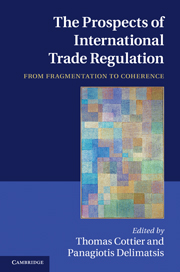Book contents
- Frontmatter
- Contents
- List of figures
- List of tables
- Contributors
- Preface and acknowledgements
- Table of cases
- List of abbreviations
- Introduction: fragmentation and coherence in international trade regulation: analysis and conceptual foundations
- PART I Constitutional issues in international trade regulation
- PART II Reforming specific areas of trade regulation
- 4 Reframing sustainable agriculture
- 5 Energy in WTO law and policy
- 6 Developing trade rules for services: a case of fragmented coherence?
- 7 Challenges of biotechnology in international trade regulation
- PART III ‘Trade and…’ linkages
- Index
- References
4 - Reframing sustainable agriculture
from PART II - Reforming specific areas of trade regulation
Published online by Cambridge University Press: 26 April 2011
- Frontmatter
- Contents
- List of figures
- List of tables
- Contributors
- Preface and acknowledgements
- Table of cases
- List of abbreviations
- Introduction: fragmentation and coherence in international trade regulation: analysis and conceptual foundations
- PART I Constitutional issues in international trade regulation
- PART II Reforming specific areas of trade regulation
- 4 Reframing sustainable agriculture
- 5 Energy in WTO law and policy
- 6 Developing trade rules for services: a case of fragmented coherence?
- 7 Challenges of biotechnology in international trade regulation
- PART III ‘Trade and…’ linkages
- Index
- References
Summary
KEY MESSAGES
∙ ‘Sustainability’ and ‘non-trade concerns’ in agriculture are political terms used for different production and trade policies.
∙ WTO rules and disciplines provide ample policy space for pursuing sustainable agricultural policies, but they must be improved to avoid protectionist misuse.
∙ The sustainability challenges in least developed countries (LDCs) are high non-tariff trade barriers and lack of investment in agriculture.
Introduction
The Agreement on Agriculture (AoA) was arguably one the most significant General Agreement on Tariffs and Trade (GATT) achievements of the 1986–1994 Uruguay Round. It came into effect with the successful establishment of the World Trade Organization in 1995. Yet, while the AoA managed to bring agriculture within the disciplines of the multilateral trading system, Members took advantage of the wide policy space available and exploited many loopholes in the agreement to ensure that they could continue with their highly protectionist policies. While global average tariffs have progressively fallen from above 40 per cent to below 4 per cent during the GATT period, the trend in agriculture seems to be the reverse in many areas. The level of effective protection against the flow of agricultural trade has been rising. Even though a fundamental principle of the AoA was the decoupling of support to the farming sector from production decisions, it did not prohibit market price support and other trade-distortive forms of support.
- Type
- Chapter
- Information
- The Prospects of International Trade RegulationFrom Fragmentation to Coherence, pp. 169 - 210Publisher: Cambridge University PressPrint publication year: 2011
References
- 1
- Cited by



